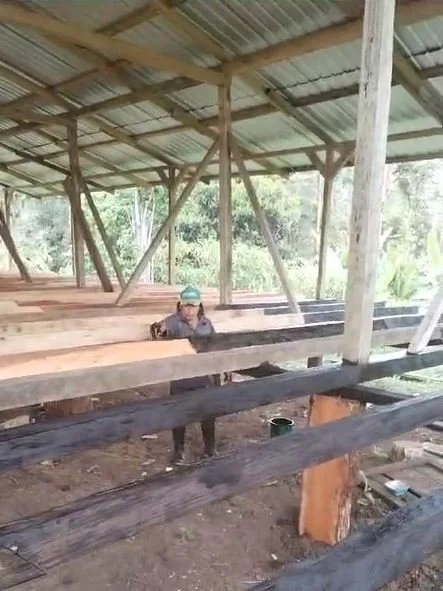
news from ecuador
Expanding Natema Jee Cultural Center
-

Dream it.
It all begins with a dream. Kitchen and dining are with porch (complete).
-
Build it.
Build it and they will come. Guest house in the making. We have been busy adding facilities that will make our rustic retreat more comfortable for guests, students, and employees. Next to our large main circular building we have added a kitchen and dining area with a small porch. In progress are guest rooms with a large porch and a water tower.
-

Grow it.
Grow it and it will sustain the many. Our ancestral gardens are creating a space for learning about ancestral wisdom with a connection between people and nature while cultivating species that have been used by the Shuar people for a millennium. These plants have deep cultural and traditional meanings passed down through generations while also promoting sustainability and self-reliance.
Kakaram Plant Conservation Project
https://nunkai.org/kakaram-plant-conservation-project
Along with our gardens, we are actively reforesting acreage that was once used for cattle grazing (one of the top contributors to deforestation globally). We are also in the process of purchasing adjacent lots to plant even more trees and attract wildlife that will bring the naturally high level of biodiversity back to this area.
Plants for health and healing:
Sacred Plants Natem, Yaji, and Tsaank are used ceremonially to heal your mind, body, and spirit
Weis/Guayusa is a traditional energy drink that also purifies your body
Maikiua/Datura is used for muscle pain and mending fractured or broken bones
Ginger for cough, intestinal cramps, and Covid symptoms
Lemon Verbena for stomach ailments
Escancel/Aerva sanguinolenta is used for kidney, liver, and prostate disease as well as for flu, cold, cough and fever (photo below)
Plants for sustenance:
We have yucca/cassava, avocado, papaya, corn, squash, pineapple, lemons, cinnamon, and multiple varieties of bananas. Uwi/Chonta palm trees produce a starchy food that is also used to make a slightly fermented drink for an annual Shuar harvest festival called Uwi Namper. The Papa Chinos shown below were grown to sell at local markets and help raise funds for our projects.
Help us preserve an ancient culture while protecting the lungs of the world
Contributions to our cultural and reforestation projects helps preserve the ancestral wisdom of local indigenous communities while also helping to regulate the global climate. If you would like to assist us in these efforts, tax-deductible donations can be made through the Indigenous & Ancestral Wisdom & Healing: Project – Nunkai Ethnobiological Foundation

